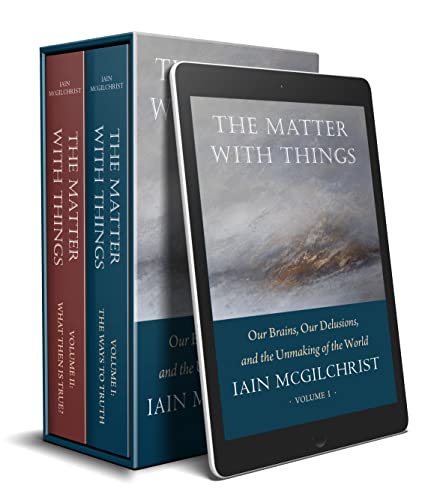Books+ Summer 2024
I have been in hunger mode. Perhaps you also go through periods where you want to learn as much as you can about everything. That's where I am now. I've read a great deal of non-fiction this year and have a long list of other non-fiction books I'm impatient to read. I love this hunger, even as it eats away at me.
--
The Matter With Things: Our Brains, Our Delusions, and the Unmaking of the World by Iain McGilchrist
Reading these books was one of the most intellectually and emotionally nourishing actions I've taken in ages. I didn't realize how starved I was for serious adult grappling with the full depth of foundational ideas; McGilchrist's books are truly something exceptional even among the best books of the day. In McGilchrist's earlier book, The Master and His Emissaries, he lays out his theory about the unique perspectives of our two brain hemispheres and how they have shaped Western history--and need to be rebalanced today. In The Matter With Things, McGilchrist goes even further, taking us into the fundamental aspects of the universe, truth, and much more. Yes, these books are long, but if you are a secular Western person with an itching sense that something is fundamentally off about modern life, or content but intellectually undernourished, it is worth your time to make your way through McGilchrist's loving and rigorous exploration of the underpinnings of the tectonic plates of human life. I am gestating my thoughts and questions on what I've read and hope to share them at some point. Stay tuned.
A Confession by Leo Tolstoy
Many people have written eloquently on this gem of an extended personal essay about Tolstoy's struggle with depression and eventual spiritual journey, so I won't attempt to say anything new here. What I will say is that if you, like many, are attempting to soothe your soul through various narcotics --social media, alcohol, political causes, work, travel, etc.--there is a deepening that comes from reading about Tolstoy's parallel struggles in a distant past. The human experience is the same set of actors on new stages every generation.
The True Believer: Thoughts on the Nature of Mass Movements by Eric Hoffer
Speaking of the same actors on different stages, Hoffer's seminal book on who becomes a true believer in mass movements and why is a timely reminder that the national conversation is often less a dialogue/fight over policy and culture and more of a clash of people who are looking for something far more personal. I was raised by true believers to be a true believer. It's a terrible life. The best thing I've ever done for myself was stepping away from all ideology and refocusing on my relationships in the here and now and curiosity about deeper truths. Ideology is a drug, whatever your flavor. Detoxing takes courage but gives you what you didn't realize you were searching for the whole time.
Colonialism: A Moral Reckoning by Nigel Biggar
I know a modest amount about the history of the British Empire. What I do know is that it's the most recent example of a truly world-altering empire that has since dispersed and gone into decline. So, I thought it would be interesting to read Biggar's take on the ethics of empires in general and this one in particular. What an audacious project. How does one possibly evaluate the ethics of such a vast and unwieldy phenomenon, from the material to the intangible cultural and ideological waft of something that spanned the globe, without being reductive? Hardly without controversy. That's what got me to open the book.
What I came away with, though, was not so much strong feelings about Biggar's arguments and framework than how much we have memory-holed the role that Christian morality played in shaping people's actions. We live in such a reflexively secular age now that it's hard to remember or appreciate how much genuine Christian morality drove the anti-slavery movement in England (and the United States) and other decisions that our ancestors made. We can understand the commercial impulse--and the politics of power and war--but the Christian impulse has become a foreign concept. This loss of connection to these older ways of thinking makes it increasingly difficult to have an accurate cultural theory of mind, particularly of the vastly complicated past.
Troubled: A Memoir of Foster Care, Family, and Social Class by Rob Henderson
Henderson is best known for coining the term "Luxury Beliefs" to describe ideas that well-off Americans use to signal status to each other but that have negative impacts on everyone (he argues that they only harm the non-elite, but I'd argue they eventually also harm the elite). This book explains how he arrived at this idea, but it also asks a question that I have never heard anyone ask before and that I needed to hear: would you rather be raised in a loving, functional home with two parents or have all the accomplishments and external rewards in the world? I was raised to choose the latter; the former was not available. But if I could do it all over again, I, like Henderson, would have chosen the former--every time.




